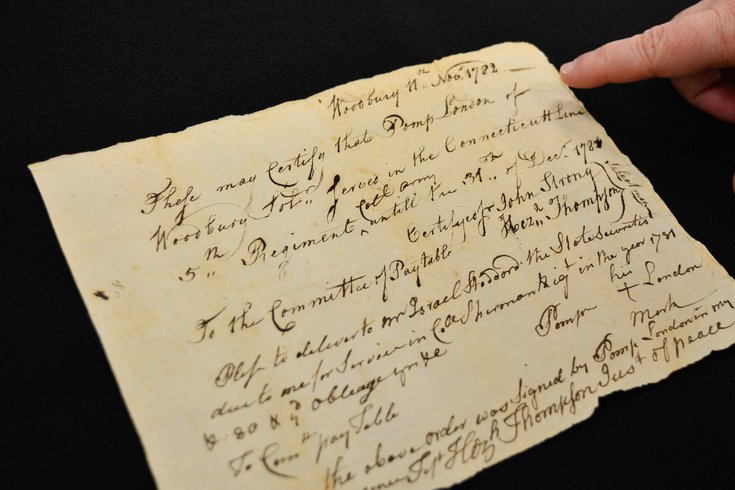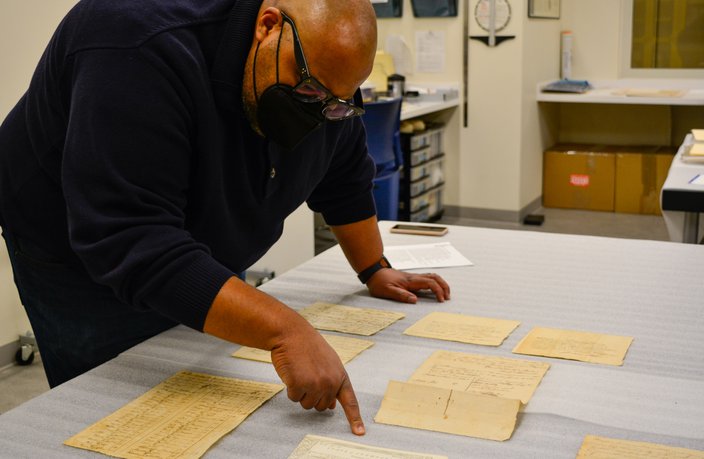
February 13, 2023
 Provided Image/Museum of the American Revolution
Provided Image/Museum of the American Revolution
The Museum of the American Revolution is partnering with Ancestry to digitize its Patriots of Color archive, which features nearly 200 rare documents bearing the names and stories of Black and Native American soldiers who served in the Continental Army during the Revolutionary War.
The Museum of the American Revolution is working to digitize nearly 200 rare documents that detail the names of Black and Native American soldiers who served in the Continental Army during the Revolutionary War.
The Patriots of Color archive will be fully digitized and made available online at no cost to the public thanks to a partnership with the genealogy website Ancestry, museum officials said Friday. The Old City museum acquired the documents in 2022 from a private collection, following contributions from several donors.
The Patriots of Color archive contains original muster rolls, pay vouchers, enlistment papers, discharge forms and other documents assembled from auctions, rare manuscript dealers and other collectors over the past two decades. Once digitized, the public will be able to learn more about the lives of hundreds of veterans of color and understand their relationship to the American Revolution.
"At least 5,000 men of color fought in the Continental Army, but their stories aren't as known as they should be," said R. Scott Stephenson, president and CEO of the museum. "This archive allows us to explore the extraordinary lives of men who helped to secure independence, yet who have not received the recognition they deserve as American Founders. We are thrilled to have the opportunity to partner with Ancestry to share these rich human stories with the world."
Michael Idriss, who has been serving as the Museum's African American Interpretive Fellow since 2020, views the documents from the Patriots of Color archive that will be digitized by Ancestry.
The documents include Continental Army records related to Jeffrey Brace, who chronicled his life from enslavement to freedom in the 1810 memoir "The Blind African Slave."
Brace, born in Africa, was not seized by enslavers until he was about 16 years old. He was shipped to Barbados, where he was treated brutally by an English seaman. He fought in the Seven Years War and was purchased by "widow Stiles" in Woodbury, Connecticut in 1768.
The widow taught Brace to read, and he served in the Continental Army. After being discharged in 1783, he was freed by Stiles' son. His nickname — Pomp London — appears on several documents in the archive. Several years ago, Rhonda Brace, one of Brace's descendants, visited the home in Woodbury and the descendants of the family that once enslaved her grandfather, six times removed.
"They actually brought us down, my dad and I went — my mother wouldn't go — we went down to what they believe were the slave quarters in the house," Brace said. "That was very, yeah ... But it was something just to be on the property."
Some of the archival documents are on display at the museum's Black Founders exhibit. The exhibit sheds light on James Forten, a Black abolitionist and Revolutionary War fighter whose family worked in the abolition movement and the Underground Railroad in Philadelphia.
These documents include a 1779 pay receipt that lists the names of 49 soldiers from the First Rhode Island Regiment and a 1783 discharge signed by General George Washington for Black soldier Brister Baker, who served in the Continental Army for six years.
There is a 1780 voucher that documents the compensation received by Tuis Sharper, a soldier of African and Native American ancestry, who served in uniform for at least six years, including nearly a year as a prisoner of war.
Tickets for the Black Founders exhibit, open now through Nov. 26, are available here. Watch a preview of the Patriots of Color archive below.
 Provided Image/Museum of the American Revolution
Provided Image/Museum of the American Revolution